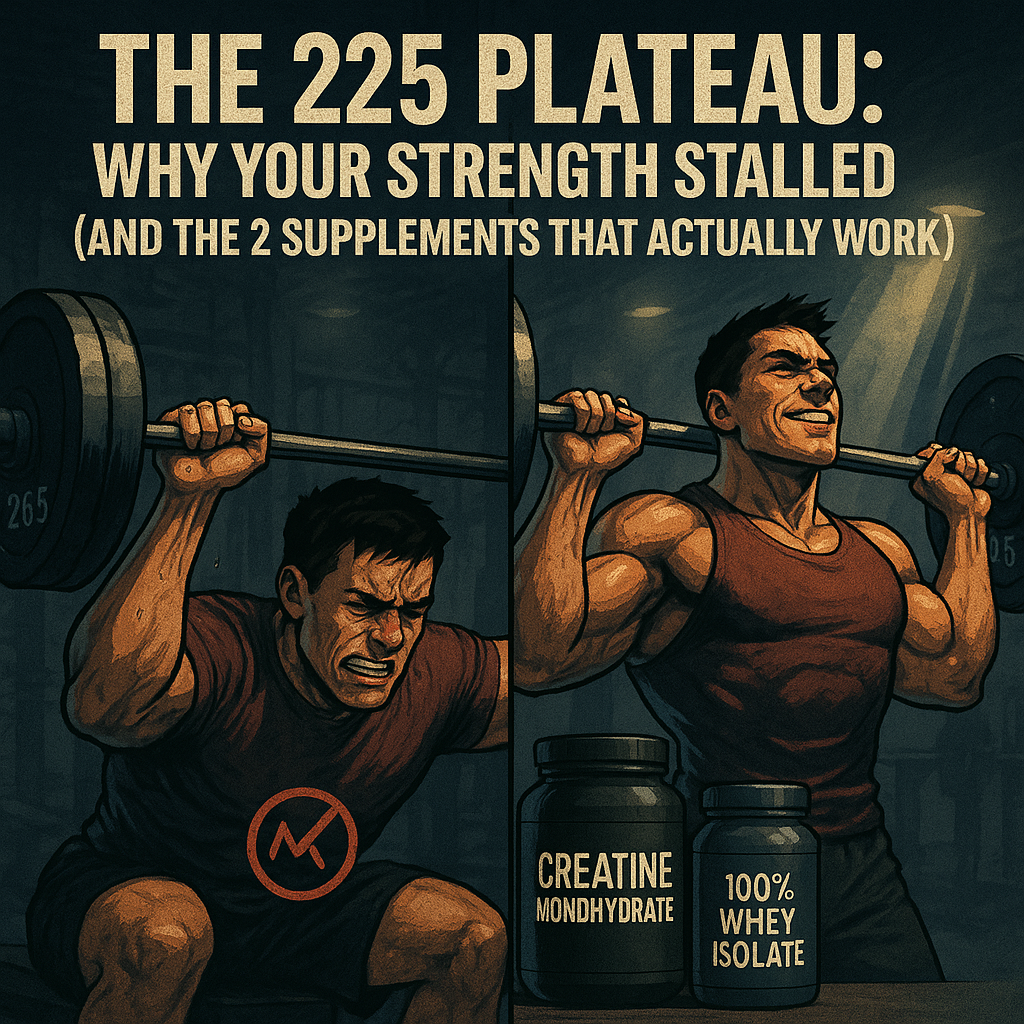The 225 Plateau: Why Your Strength Stalled (And The 2 Supplements That Actually Work)

Have you ever wondered why some lifters break through plateaus while others stay stuck forever?
Meet Marcus Chen, a 27-year-old powerlifter from Austin, Texas. For 14 months, his bench press stayed frozen at 225 lbs. No matter how hard he pushed. No matter how many programs he tried.
- That's where it ended. Every. Single. Time.
He'd add weight to the bar, get under it, unrack... and fail on rep 3. Then one day, Marcus discovered something in a research paper that changed everything. Within 8 weeks, he hit 265 lbs. That's a 40-pound jump. After MORE than a year of nothing. His training didn't change. His diet didn't change. So what happened?
The PR That Broke Everything Open
Marcus had always been religious about his training. 4x per week. Never missed a session. Push/pull/legs split with a dedicated strength day. He tracked every rep, every set, every pound on the bar. But somewhere around month 6, everything just... stopped. His squat stuck at 365. Deadlift at 425. Bench at that cursed 225. "I started questioning everything," Marcus told us. "Was my programming wrong? Was I not eating enough? Not sleeping enough? Was I just... done growing?" That doubt is the worst part. Not the physical plateau. The mental one. When you start wondering if you've hit your genetic ceiling at 27 years old. Marcus tried everything the forums recommended:
- Deload weeks (helped temporarily, then plateau returned)
- Different rep ranges (5x5, 3x8, German Volume Training)
- More food (gained 8 lbs, mostly fat, lifts didn't budge)
- Pre-workout stimulants (felt jittery, still weak)
Nothing moved the needle. Then, late one night scrolling through Reddit's r/powerlifting, Marcus found a comment that stopped him cold:
"Bro, creatine is the GOAT. It's not steroids, it's not magic, but it's the only supplement with 500+ studies proving it works. If you're not taking it, you're leaving 5-15% on the table. Do the math on your total."
5-15% on his lifts?
That would be 11-33 pounds on his bench alone.
Marcus had always dismissed creatine. Thought it was:
- Just water weight ("I'll lose my abs")
- Kidney damage waiting to happen
- Something you had to cycle on and off
- Bro-science supplement company BS
But that comment sent him down a research rabbit hole.
The Restricted Research (That's Actually Public)
What Marcus found wasn't in some secret library section. It was hiding in plain sight. The International Society of Sports Nutrition (ISSN) had published a massive position stand in 2021. Over 500 studies. Decades of research. The conclusion?
Creatine monohydrate is the single most effective ergogenic supplement for increasing high-intensity exercise capacity and lean body mass.
Not "might help." Not "possibly effective." The most effective. Period. The data showed:
- 5-15% increases in strength and power output
- Improvements in repeated sprint performance
- Enhanced work capacity during intense training sessions
- Gains in lean muscle mass when combined with resistance training
And here's what shocked Marcus most:
It's not just safe—it's been studied for over 30 years with zero evidence of kidney or liver damage in healthy individuals.
All those fears? Myths. The kidney damage concern came from one anecdotal case report in the 1990s involving someone with pre-existing kidney disease. Every major study since has cleared creatine completely.
As one researcher put it: "Creatine supplementation at recommended doses doesn't harm kidneys or liver—it's as safe as the protein in your diet."
But Marcus Still Had Questions
See, Marcus is the kind of lifter who doesn't just follow advice blindly. He's natty and proud of it. He wants to earn every pound on the bar. So he kept digging.
"What about the water weight?"
This is where it got interesting. Yes, creatine causes water retention. About 2-5 lbs in the first few weeks. But here's the thing nobody tells you:
It's intramuscular water. Not subcutaneous.
Translation? The water goes INSIDE your muscle cells, not under your skin. One study participant on Reddit said it perfectly: "It's not bloat—it's water in your muscles powering extra reps. You look MORE defined, not puffy." That water inside the muscle? It actually improves muscle function and creates better leverage for strength. It's not fake weight. It's performance hydration.
"Will I have to cycle off?"
Nope. Unlike stimulants or hormones, creatine doesn't down-regulate your body's natural production in any harmful way. The research is clear: 3-5g daily, continuously, is safe and effective long-term. No cycling needed. No "breaks" required. Just consistent muscle saturation and consistent strength gains.
"Does timing matter?"
Not really. Marcus found study after study showing that WHEN you take creatine doesn't matter nearly as much as taking it consistently. Pre-workout, post-workout, morning, night—doesn't matter.
What matters? Daily dose. Every day. Muscle saturation happens in 3-4 weeks with 5g daily (or faster with a 5-day loading phase of 20g if you're in a hurry).







